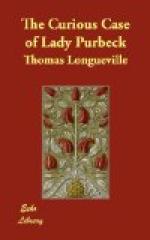“Now the Cause of Sir Robert Howard was this: He fell in League with the Lady Viscountess Purbeck. The Lord Viscount Purbeck being in some weakness and distemper, the Lady used him at her pleasure, and betook her self in a manner, wholly to Sir Robert Howard, and had a Son by him. She was delivered of this Child in a Clandestine way, under the Name of Mistress Wright. These things came to be known, and she was brought into the High-Commission, and there, after a Legal Proceeding, was found guilty of Adultery, and sentenced to do Pennance: Many of the great Lords of the Kingdom being present in Court, and agreeing to the Sentence.”
A marginal note states that there were present Sir Thomas Coventry, the Lord Keeper of the Great Seal, the Earls of Manchester, Pembroke, Montgomery and Dorset, Viscount Grandison, five Bishops, two Deans and several other dignitaries, clerical and legal.
Laud continues: “Upon this Sentence she withdrew her-self, to avoid the Penance. This Sentence passed at London-House, in Bishop Mountains time, Novemb. 19. An. Dom. 1627. I was then present, as Bishop of Bath and Wells.”
The sentence in question was that Lady Purbeck was to be separated from her husband, and that she should do penance, bare-footed, and clad in a white sheet, in the chapel of the Savoy; but a decree of divorce was not given.
No attempt shall be made here to excuse or palliate the sins of Lady Purbeck; but it may be observed in relation to Laud’s mention of her having been found guilty of adultery by the Court, that, although she might be guilty of that offence according to the civil law, she was not guilty of it morally; because her so-called marriage was no marriage at all, since she was forced into it against her will.
It cannot be a matter for surprise that Lady Purbeck “withdrew herself” rather than do penance, barefooted, in a white sheet in a fashionable church, and before a crowded congregation, for a crowd there would certainly have been to enjoy the spectacle of the public penance of a Viscountess. For some time her place of withdrawal or, to speak plainly, her place of hiding, was undiscovered. As we have seen, she was sentenced on the 19th of November. She was not arrested; but she was commanded to “present herself” on a certain Sunday at the Savoy chapel, to perform her public penance. As might have been expected, she did not present herself, to the great disappointment of a large congregation, and she thereby exposed herself to arrest. The officials did not discover her place of retreat until about Christmas. The following story of an incident that then happened in connection with this matter is told by Sir John Finett.[80]




